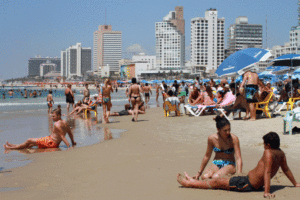When Ioana Isac of Romania disembarked at Ben Gurion International Airport she was shocked to discover she was Israel’s three millionth tourist of 2017. Isac and her partner were treated to a red-carpet welcome and offered an upgraded hotel suite, a limousine, helicopter ride and even a personal tour by Prime Minister Binyamin Netanyahu.
Indeed, Israel’s tourism industry is seeing its greatest growth in years, at least based on recent statistics, after numbers dropped due to the 2014 war with Hamas. The Palestinian “knife intifada,” which resulted in tens of Israelis killed or wounded over the past two years, also likely contributed to the dwindling number of tourists.
By contrast, the Israeli Tourism Ministry registered a 57% increase in tourist entries and a 106% increase in day visitors this October as compared to last year. In fact, over 400,000 tourists visited the country in October alone, Israel’s best-ever month for incoming tourism.
And according to Israel’s Central Bureau of Statistics, between January and October of 2017 nearly three million tourist entries were recorded, a 26% increase year-over-year.
Tourism Minister Yariv Levin, commenting on these numbers, said, “This is an unprecedented statistic…the numbers we are witnessing this year are unmatched. These are not random, but rather the direct results of strenuous work, a change in marketing strategy and an increase in flights.”
Israeli cities made it into the top 100 most visited travel destinations according to market research company Euromonitor International, with Jerusalem coming in 67th and Tel Aviv 78th.
In general, there is an upward trend in tourism to Mediterranean countries, including Cyprus, Italy and Greece, with all three benefiting from a record number of visitors in 2017.
Yoav Gal, founder and CEO of Israel My Way, a boutique travel agency specializing in unique, tailor-made tours in Israel, shared his perspective with The Media Line: “In addition to increased numbers of tourists, the other trend we are seeing, which makes our life harder, is that the lead time is getting shorter. American tourists used to book far in advance, but this lead time has shortened dramatically. Sometimes our customers give us just a week’s notice.”
Gal cited global terrorism as a possible cause for this. “My feeling,” he elaborated, “is that while in the past Israel used to be associated with terror attacks and unstable security conditions, now the whole world is the same. There are attacks everywhere. People do not want to commit to travel dates in advance over fears of having to cancel due to a terror attack somewhere. So they wait to book until the last minute.”
Tourism Ministry spokeswoman Anat Shihor-Aronson agreed. “People today understand that there is no guaranteed safe place in the world,” she asserted, “and they realize now that Israel is equally as safe as anywhere else, if not more [so] because of its counter-terrorism experience.
A spokesperson for the Israel Hotel Association (IHA), the umbrella organization for the hospitality industry in Israel, told The Media Line it “welcomes the increase in tourist traffic and hopes that the trend will continue over time.” The IHA also highlighted the “increase in the Ministry of Tourism’s marketing budget.”
Shihor-Aronson provided another potential reason tourism is on the rise; namely, that Israel is running campaigns focusing on new markets such as Romania, Poland and China. “We are opening Israel to more direct flights,” she explained, “and airlines receive a large grant from the Tourism Ministry as encouragement.”
“We also offer incentives for tourists landing in Eilat from October to May. Lots of companies are offering this option for the first time, contributing to the increase.”
But can Israel’s tourism infrastructure handle more tourists?
Shihor-Aronson claimed that Israel does not have enough hotels, but is “trying to generate competition and cut bureaucracy, which we hope will lead to lower prices.”
This contrasts with IHA’s opinion that “there is currently no shortage of hotel rooms.”
“It is true that there are very busy periods or days,” a representative of the body stated, “but on an annual average, there is room for additional tourists. In the long term, if the number of incoming tourists exceeds four or five million, then additional hotel rooms will be needed.”
Israel My Way CEO Gal said that “while Israel is building more hotels, there are many bottlenecks. Even if there are enough hotel rooms, certain tourist sites cannot hold the capacity.”
“For example,” he said, “the Old City of Jerusalem is becoming very crowded. Some sites are fully booked months in advance, such as the Western Wall Tunnels. A few tourists are fine, but if a cruise ship with 2,000 people docks in Haifa, these types of sites can’t handle that amount of tourists at one time.”
Either way, if this upward trend continues perhaps next year Israel will celebrate four million tourists.
SOURCE: TheMediaLine
Currently reading:
891







